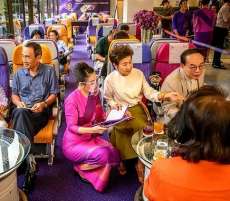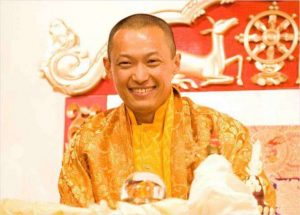Beginner’s Mind is a special project from BDG collecting insightful essays written by US college students who have attended experiential-learning-based courses related to Buddhism. Some of the authors identify as Buddhists, for others it is their first encounter with the Buddhadharma. All are sharing reflections and impressions on what they’ve learned, how it has impacted their lives, and how they might continue to engage with the teaching.
Daphne Zhu wrote this essay for her Buddhist Modernism course at the University of Southern California. Daphne is currently a junior majoring in public relations with a minor in applied data analytics, and is expected to graduate in May 2023. As an aspiring public relations professional, she hopes to work in the technology or entertainment industry after graduation. Daphne enjoys fashion, music, and photography.

Learning to Engage with Buddhism
When I first decided to take this course, I was interested in learning more about religion as a whole. I grew up in a nonreligious family, so studying and learning about religion and how it influences people’s lives was something that I had always wanted to explore. I had thought that Buddhism was one of the religions that I was more familiar with because my family drew on Buddhist practices the most, but I realized through this class how little I really knew.
Something that I’ve really enjoyed in this class has been reading about the various ways in which Buddhism impacts our lives, from education to ecology. My lack of exposure led me to think that religion only affects our personal lives as an internal force rather than an entirely new way of thinking that influences all aspects of society. Through the course readings, content, and assignments, I’ve been able to understand so much more about Buddhism and its impact on society. I now feel better able to understand how it affects our lives in a broader sense. I think it’s also interesting to apply my new understanding of Buddhism to modern-day issues, from COVID-19 to hate crimes against Asian Americans; it’s been fascinating to consider the Buddhist teachings in the context of such modern-day scenarios. I think my greatest takeaway from this class has been that Buddhism includes a lot more than just meditation, and that was something that I had never realized before.
As I’ve gone through this course, I’ve definitely noticed that my relationships with myself and others have changed. I’ve tried to bring some of the core Buddhist principles into my own relationships—such as the Four Noble Truths and the Noble Eightfold Path—and I feel that this has made me more self-aware and appreciative of the people in my life.
As someone who constantly keeps themselves busy, it has been nice to have an excuse to take time for myself and to reflect on the day. Buddhism’s focus on one’s self was something that I really liked, since I feel like I’m always doing something and I never have time for self-care or relaxation. Through learning more about Buddhism, I’ve tried to take on some of the teachings and ideas in my own life, and this has definitely brought improvements and helped me to feel better about myself. Self-care and prioritizing myself now comes in small forms, such as cleaning my room, treating myself to a meal, and spending time with friends, which has improved my mental well-being as well as my overall health.
Since Buddhism encourages inner reflection, I’ve noticed that consistent meditation has allowed me to take time out of my busy day to prioritize myself and my thoughts, which has been incredibly helpful in terms of keeping myself mentally stable in moments of stress. I’ve been more calm and focused, and I definitely credit that to meditating every day. Because of these positive changes in my life, I plan to continue meditating at least a few times a week through an app such as Headspace.
Religion and social change are topics that I’ve had difficulty understanding well, since I used to view religion as too traditional, outdated, and rigid to adapt to the problems and issues of the modern world. However, I was surprised to learn about Buddhism and climate change, and the concept of socially engaged Buddhism, which seems to have proven me wrong about religion and its ability to remain current. Many of the class readings—especially about socially engaged Buddhism—have shown me that Buddhism has the ability to influence, to bring about change for the better. An example of this is African American Buddhism (which I had no idea existed), and how it addresses many issues facing American and world culture, such as #BlackLivesMatter, police shootings, and racism. It wasn’t something I had expected to learn in this class, and I don’t know if I would ever have been able to encounter it in the same way elsewhere.
Because of my background, I went into this class with an open mind, hoping to come out with more knowledge and understanding compared with when I started, which I think I’ve achieved. However, I’ve also noticed that throughout the class I have found myself wanting to hear directly from someone with more experience than me—such as an expert or experienced Buddhist practitioner. I’m definitely someone who takes other people’s opinions and experiences into account before going through something myself, and I wish that I could have heard about people’s experiences on how Buddhism changed their lives and their opinions, and how they feel it could change in the future.
A topic that really interested me this semester was the debate on Buddhism and ecology—I had always thought that religions encouraged the idea of treating living beings with respect and taking care of the environment, but Johan Elverskog’s podcast about Buddhism and environmentalism really changed the way I thought about the relationship between religion and nature.* The points that Elverskog brought up were incredibly interesting, and I found myself persuaded by some of the arguments he made. I think the topic of Buddhism and climate change will definitely be something that I’ll continue to explore beyond this semester, especially in light of the importance of global warming/environmental awareness today.
If I had to describe this class in one word, I’d say “unexpected,” because I learned about Buddhism in ways that I’ve never could have anticipated.
* This refers to a podcast on New Books Network, an interview with Johan Elverskog on his monograph The Buddha’s Footprint: An Environmental History of Asia (University of Pennsylvania Press, 2020).
Related features from BDG
My Personal Journey
On Wisdom
Buddhist Modernism: A Transformative and Empowering Think Tank for Social Change











